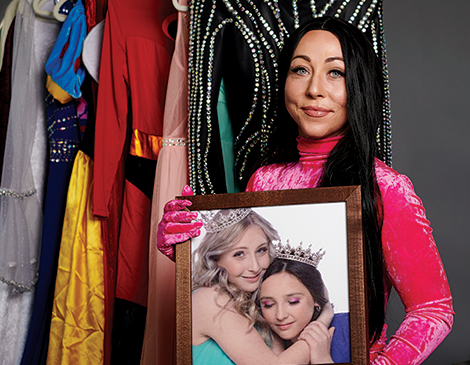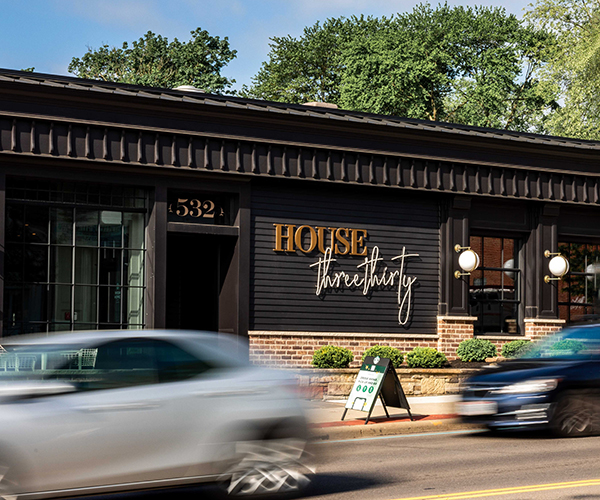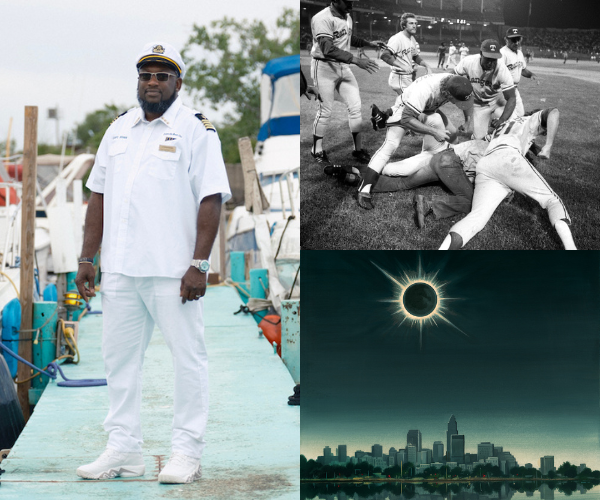It’s three months to Halloween, and Anna Chambers’ costume has finally arrived.
“Ready to see it?” she texts me.
Yes! I, like so many of Anna’s family and friends, have been waiting for this moment. For the past 10 years, the unveiling of Anna’s costume has been an event as anticipated as the arrival of Christmas.
“I think she’s going to be some sort of celebrity,” Anna’s 14-year-old daughter, Stella, muses.
Anna’s older sister, Kelly Budinger — one of the few who does know what Anna will be — thinks the kids will love it. “I just hope people don’t read into it,” she says. Kelly hates when people misinterpret Anna’s costumes.
Every year, on Halloween, Anna scoots the kids off to school in her leggings and baseball cap. Then, when the school day is over, she greets them, totally transformed. She has arrived at the bus stop as Maleficent in a long sweeping black dress, her blonde bob tucked into a horned headpiece. She’s squeezed herself into a studded bodysuit and matching high-heeled boots to look like Lady Gaga. And she’s pranced down the sidewalk in a fluffy pink dress as Glinda the Good Witch.
Last year, Anna put on an asymmetrical blonde wig, a fanny pack and a shirt that read “I need to speak to the manager.” The "Karen" costume had mixed reactions, with some telling Anna she shouldn’t be so political.
But Anna always ignores such comments. She chooses her costumes with only one goal — to surprise and delight her two daughters with a tangible, gleeful visual moment. “Something we can laugh about and remember for years to come,” she says.
And memories — both those from the past and those being made now — are so important to Ava and Stella. The girls, who were not yet in school when their father died, were born with Usher syndrome, a rare genetic disease that causes deafness at birth, severe balance issues and eventual blindness. The girls do have cochlear implants, but their worsening peripheral vision is causing a narrowing of their world that can’t — as of yet — be corrected.
While there are promising studies underway, which Anna helps raise money for, the reality of Usher syndrome is that most kids with the subtype Stella and Ava have lose night vision by age 10 — and all sight by adulthood.
Part of Anna’s goal with the small window of time the girls may have left is to create a lifetime of visuals to draw from. That means taking family trips to see the Eiffel Tower, swimming with dolphins in Florida and stopping every day to savor the redness of a tulip or a streak of sunlight.
And it means turning the narrative of Halloween around for the girls. It used to be that, as soon as they got off the bus, Anna would rush her daughters out to go trick-or-treating in order to get the most amount of daylight. But no matter how early she started, the girls would be stumbling over tree roots or crashing into other kids on driveways. And the fact that the day came so close to the anniversary of their father’s death made it worse for everyone.
Now Halloween is something they all look forward to. For Anna, that is everything.
“I want the girls to be able to close their eyes years later and see those memories,” she says. “No matter what happens.”
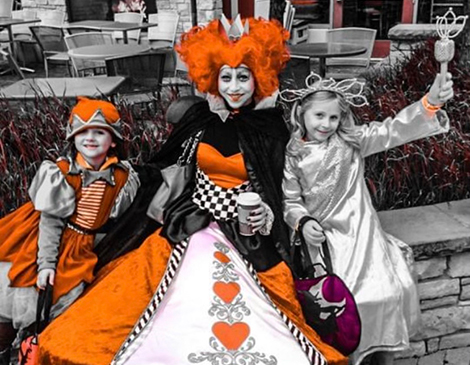
Growing up in Jackson, Michigan, Anna was an athletic, curious child. She was a cheerleader, an ice skater and a cross-country runner before heading off to Western Michigan University to study journalism. But she wasn’t super interested in her classes. “I was just in a rush to get to the next stage of my life,” she says.
One person who steadied her was Jeff Haney, a fellow student who had grown up a few towns over from Anna and charmed her with his quiet confidence, Midwestern values and warm smile.
Jeff had intended to be an airline pilot. But after 9/11, he felt a call to defend his country and joined the Air Force.
Anna, meanwhile, had a desire to see the world. After college, she worked as a flight attendant for Northwest Airlines, traveling the world.
But being with Jeff felt like being home. So, when she got laid off and Jeff proposed to her in 2001, she said yes immediately, despite the fact that she was only 22. “I knew what a good man he was,” Anna says. “And I knew that he would be a really great dad, which he was.”
In 2004, when Anna found herself holding a positive pregnancy test, she was elated. Ava was born in October 2005, one month after Anna and Jeff had relocated to Panama City, Florida, for F-15 training. A few hours after the delivery, a nurse came in to tell them Ava had failed her hearing screening. But babies, she added, often have fluid in their ears. “We didn’t think much of it,” Anna says.
At home, Anna — like all new moms — adjusted to new rhythms. Ava didn’t take easily to feeding and was often up, wailing, at night. Anna tried to soothe her by singing lullabies and talking softly to her.
A few weeks later, Anna and Jeff took Ava to the audiologist. She can still recall the physical shock that ripped through her body when she heard the doctor say that Ava was “profoundly deaf.”
“I remember hearing her but not really registering what she was saying,” Anna says. The doctor started talking about things like cochlear implants and Anna mechanically took notes. The impact of the diagnosis hit her later, in the car, as she tried to soothe Ava by singing to her. “All I could think of, I’d been talking to my baby this whole time and she couldn’t hear anything I said,” Anna recalls.
Half of all cases of early childhood hearing loss are due to genetic factors, and Ava was tested for connexin 2 GJB2 gene mutations, the most common cause of congenital hearing loss. After the test came back negative, doctors didn’t advise any other testing. Rather than go searching for potentially unknowable answers, Anna focused on the future.
“I wanted to be able to communicate with my baby,” she says.
Anna signed up for sign language classes and dove into research on cochlear implants. The next step was flying with Ava to Seattle for surgery to insert tiny electrodes into her cochlea. Through weekly therapy appointments, Ava slowly learned how to hear.
Those first years were hard, though. Jeff, who would become one of the Air Force’s top pilots, was gone for days and months at a time on missions and trainings. And Anna was exhausted, shuttling between speech appointments and caring for Ava. “I couldn’t even unload the dishwasher because I was worried she’d take the implant out of her ear and eat it,” she says.
But, by the second year, things had settled. Ava spoke her first word — “ball” — at 17 months. Soon after, she was putting the cochlear implants on herself.
Anna felt like she could breathe again.
And she and Jeff started discussing having another child.
Neither Jeff nor Anna had any family history of hearing loss and they were encouraged by Ava’s negative connexin test. But even if they had another deaf child, they knew they could handle it. “It wasn’t so scary that we didn’t want to have more kids,” Anna says.
On Jan. 20, 2008, Stella arrived — a fiery, almost 10-pounder with a tuft of dark hair. Once again, Jeff and Anna fell instantly in love. But a few hours after Stella’s birth, a nurse came to tell them Stella had also failed her hearing test. The nurse, again, told Jeff and Anna not to worry, because it was “probably a build-up of fluid.” Anna looked at Jeff and “just kind of laughed a little,” Anna recalls.
Neither needed the confirmation that came from the audiologist weeks later. They already knew they were the proud parents of two girls with hearing loss.
In some ways, it was easier having two children with deafness. Ava took on the teacher role, helping Stella learn to sign and put on cochlear implants. “We were up for the challenge of whatever it is that they needed,” Anna says. Things seemed like they would be OK.
And then at 11 p.m. on Nov. 16, 2010, long after Jeff was supposed to be home, Anna heard a knock on the door.
“We can’t find your husband,” Jeff’s squadron commander said.
For two days, Air Force personnel looked for Jeff.
And then Anna got the news. His plane’s engine had malfunctioned at 50,000 feet, shutting off the oxygen system. Jeff went down with the plane.
The Air Force called the crash “pilot error,” which still makes Anna’s blood boil. “When those things happen to you and you can’t breathe, I don’t really think that there’s anyone that could have recovered from something like that,” she says.
But beneath the grief, anger and sadness, the hard truth remained. Anna was now a widow with two deaf girls, living alone in Alaska. She needed help. She called her sister, Kelly, who lived in Avon with her husband and three young sons.
“Move here,” Kelly said immediately.
Kelly sent her videos, and Anna negotiated — and bought — a red brick colonial over the phone. In March 2011, Anna and her girls arrived at the doorstep of a home freshly painted by her family. The new paint was a reminder — hopefully — that lives, too, could be refreshed.
Anna kept an eagle eye on the girls as they all tried to adjust to their new life. And she began to worry. Both girls had trouble with balance. Neither Ava nor Stella walked until age 2, and when they did, they struggled. “It was like we’re taking really small steps,” Anna recalls.
There were other smaller things too. If Stella or Ava turned around too quickly at the dinner table, they’d fall off the chair. They were both constantly tripping over curbs and tree roots.
Anna started to think there was something else going on with the girls, aside from their deafness. At first, friends and professionals waved off her concerns, telling her that deafness affects equilibrium and trauma can affect bodies in all kinds of ways. But Anna started Googling words like “hearing loss” and “balance.”
That’s when she first came across a description of Usher syndrome. Though she had no physical proof, she felt in her gut that it was the reason her girls struggled. “I think sometimes moms are better researchers than even the FBI,” she says.
Anna made an appointment at the Cleveland Clinic Cole Eye Institute. Doctors conducted a thorough vision screening and genetic testing. The tests were conclusive. Both Stella and Anna were diagnosed with Usher syndrome type 1B in which vision is lost significantly faster than other subtypes.
“Was I a serial killer in another life?” Anna thought. “It felt like too much.”
But after a few days of wallowing, Anna rallied. “This is what we got dealt with. Fine. But we’re not going to let things that happen to us be an excuse to not try hard or live our best lives.”
Anna decided to document her family’s journey on a Facebook page she called Sisters for Sight. “I felt like I needed to do something proactive,” she says. “It was a way, too, to raise awareness and funds for scientific research for a really rare disease.”
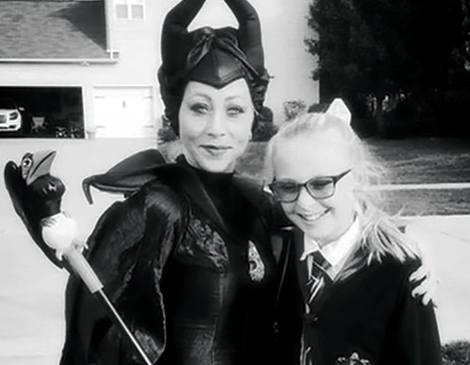
Anna would be the first to point out that life is neither all good nor all bad. About a year after Jeff died, Kelly convinced Anna to go to Five Guys for lunch. The two were sitting at a table when they noticed a 20-something guy with a chiseled jaw and strong stance. Kelly did a quick check and didn’t see a ring. “He’s cute,” she said to Anna. And for the first time in a long time, Anna agreed. Kelly — normally the more conservative of the two — surprised herself after Anna left by approaching the man, whose name she found out was Nick Sweetnich. Then she told Anna what she’d done.
Anna wavered for days but finally agreed to reach out and arranged to meet. “My sister made me go,” Anna says.
But she softened when Nick, a firefighter, came over to their house to meet the girls. He taught them fire safety drills. And when Ava got sick later that night, Nick sat downstairs with Stella while Anna took care of her. Forty-five minutes later, when Anna came back downstairs, Stella announced proudly that “the fireman taught me to blow my nose” (a skill Stella had never been able to master). “I thought, huh, this is a good guy,” Anna says.
And for more than 11 years now, Nick has continued to be just that for Anna and the girls — a protector, a teacher, the source of permanent, steadying love and support she didn’t think she’d ever find again. “When Jeff died, I took on the role of both mom and dad,” Anna says. “Nick showed me I didn’t have to do this alone.” In 2014, the family expanded, when Anna and Nick welcomed their son Vinny.
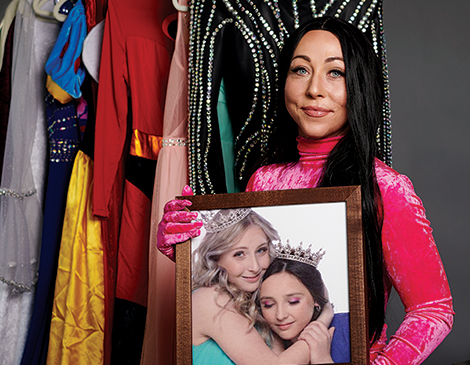
Fourteen-year-old Stella sits with her mom on the porch on a Thursday night in July, wearing an oversized firefighter hoodie and twirling her long brown hair.
Stella will attend Magnificat High School soon, and she’s excited. “I think meeting new people and making new friends is going to be fun,” she says, her voice as peppy as her personality.
Stella’s not really worrying, she says, about telling new classmates about Usher syndrome. With cochlear implants, both she and Ava (who didn’t want to be interviewed for this story) can hear and speak well. “A lot of people don’t know that Ava and I are deaf until they see or we show them our cochlears,” Stella says. And sometimes, Stella doesn’t mention Usher at all. “I just don’t think it should be, like, a main focus,” she says.
Right now, Stella is busy running and editing her own podcast called Live Happily, where she talks about issues like bullying and gives tips to organize your room (Stella is very organized). “I think it’s easy for me because I’m just in my room talking at the wall,” she says.
With the hustle and bustle of teenage life, Stella isn’t really thinking about future vision loss. “I’m kind of like, we’ll cross that bridge when we get there,” she says. If she has noticed any changes with her eyes, “it’s like very slight,” she says. In the future, she hopes to be an aesthetician. And maybe one day, she says, she’ll be a spokesperson for Usher syndrome, but for now she’s just happy to think about normal teenage stuff.
Anna watches proudly as her daughter bops away at the end of the interview to go hang out with a friend. Both her girls have come so far. Ava, who has a more introverted and free-spirited personality, was competitive in judo until a recent bout with ulcerative colitis. She’s easing back into the sport and starting at a new school in the fall, too — Avon High School — where she’ll be a junior.
“They’re very, very resilient kids,” Anna says. “That’s something I’m probably most proud of. All they’ve had to overcome from the time they were little. I think it’s going to make them very well-rounded adults.”
But as the mother of two kids with Usher syndrome, day-to-day life for Anna can still be a little fraught. There are things that Anna has to think about, all the time, to make sure they are safe.
For instance, if the sound processors on the girls’ cochlear implants are turned off, which happens at night or when they are in the shower, they’re completely deaf.
Vision is another matter. Right now, the girls, who both wear glasses and contacts, can’t see at all in the dark and are losing their peripheral vision, but their central vision is still good. But, every year, Anna panics a bit before taking the girls to the eye doctor, worrying about how much sight they might have lost in the past year.
The unknown is what makes things so scary. “It’s hard because, for some people, their vision diminishes quickly,” says Anna. “They wake up and can barely see like a pinhole. For other people, it goes a lot slower.”
So Anna controls what she can. Recently, she’s started leaving magnifying glasses in the girls’ rooms. She’s taught them to advocate for themselves and walked them through how to talk to their teachers if they can’t see the board well or hear what’s being said. COVID-19, Anna says, was a nightmare for the girls with everyone wearing masks and trying to hear on a Zoom call.
In general, the family tries to live in the present. “Just look at my life,” Anna says. “It’s proof you never know what will happen. You make plans and then end up living a completely different life.”
And, she says, “with the research and things out there, we never know what is going to be available in the future.”
The studies into treatments that have the potential to slow, stop or reverse retina degeneration related to Usher syndrome are indeed promising. For instance, gene editing, the act of repairing specific gene mutations, is gaining a lot of interest in the vision impairment community.
Many advocates believe vision loss related to Usher syndrome is a solvable problem. “If Elon Musk or Jeff Bezos’ kid had Usher syndrome, I can tell you this probably would be cured in a year or two,” says Justin Porcano, the founder of Save Sight Now. “The science is here. It’s just about funding it now.”
Anna, though, does not want to lean so far into hope that she sets unrealistic
expectations for her girls. “Our motto is that we prepare for the future,” she says, “but we don’t dwell on it.”
“Yes, I worry about the girls,” Anna adds, “but every mom worries. It’s what it means to be a parent.”
And in the end, that’s where Anna’s resiliency comes from. “Everybody always says, ‘Oh, you’re so strong.' But when you have no other option but to be that way, I think that everyone would be that way,” Anna says. “When you’re a mom, you just do what you have to do.”
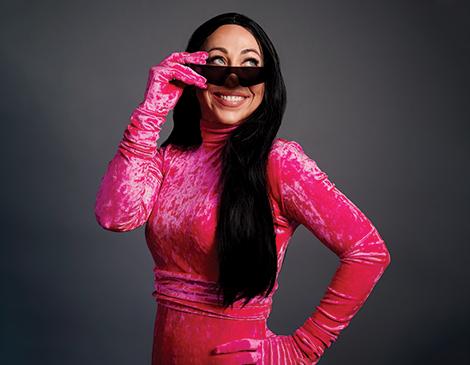
On a humid night in August Anna opens the door to her parents’ Avon house, where she has invited me to a preview of this year’s costume before it’s unveiled to her children on Halloween. She is dressed from neck to toe in hot pink stretchy velvet and her blonde hair is covered with a long black wig. She’s colored her eyebrows brown and is wearing magnetic eyelashes that make her lashes look silken and dark.
“I’m Kim Kardashian,” she says, pushing her shoulders back, and chest forward.
The Kardashians, Anna explains, are a constant source of entertainment for the family. “The kids call me a mom-ager, like Kris Jenner,” Anna says.
Some people, she knows, will start conversations about Kim as a mom or Kim and Kanye. But none of that matters to Anna. She just knows that putting on a mock-up of one of the outfits Kim wore when she hosted Saturday Night Live will make her kids laugh.
“I think they’ll just be like oh mom, but they’ll get a kick out of it,” Anna laughs.
And it feels surprisingly good to wear the stretchy pink velvet and high heels. Then again, as Anna says, “I’m comfortable in what a lot of people are not comfortable in.”
It’s a theory that doesn’t just explain her costume but also summarizes the way she has decided to live, taking the things life has thrown at her and finding a way to live joyfully through them.
As she prepares to take off her costume and return to her family, she’s thinking, as she always does, about her girls and Vinny and their happiness and futures.
“I can’t wait," she says, "to see the look on their faces.”
Start your day the best way by signing up for our free daily newsletter. Arriving in your inbox every morning to keep you in the loop on the best guides, home and style tips, and news briefs for all things Cleveland. Click here to subscribe.

